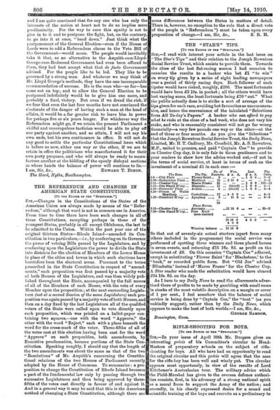THE REFERENDUM AND CHANGES IN AMERICAN STATE CONSTITUTIONS. [To THE
Erma or THE " Sr scrAnat.1 SIR,—Changes in the Constitutions of the States of the American Union are always made by means of the "Refer- endum," although that word is not in common use in America. From time to time there have been such changes in all of these Constitutions, excepting perhaps in those of the youngest States, probably in all except Oklahoma, the last to be admitted to the Union. Within the past year one of the original thirteen States—Rhode Island—amended its Con- stitution in two particulars,—i.e., by conferring on its Governor tic power of vetoing Bills passed by the Legislature, and by conferring upon the Legislature the power to divide the State into districts for the election of Members of the Lower House in place of the cities and towns in which such elections have heretofore been the electoral areas. Pursuant to the terms prescribed in the State Constitution in respect of "amend- ments," each proposition was first passed by a majority Tote of both Houses of the Legislature, and was then widely pub- lished throughout the State, accompanied by the full names of all of the Members of each House, with the vote of every Member upon the proposition; at the next succeeding Legisla.- tare (not at a second Session of the same Legislature) each pro- position was again passed by a majority vote of both Houses, and then on a day fixed by the last Legislature all of the qualified voters of the State were called upon to vote directly upon each proposition, which was printed on a ballot-paper con- taining two squares,—one with the word "Approve," the other with the word "Reject," each with a place beneath the word for the cross-mark of the voter. Three-fifths of all of the votes cast at this election having been cast for the word "Approve" on each proposition, both amendments, by Executive proclamation, became portions of the State Con- stitution. Speaking roughly, I should say that the length of the two amendments was about the same as that of the two "Resolutions" of Mr. Asquith's concerning the Constitu- tional relations of the two Houses of Parliament recently adopted by the House of Commons. To summarise : a pro- position to change the Constitution of Rhode Island becomes a part of the fundamental law only by passing through two successive Legislatures and then being approved by three- fifths of the votes cast directly in favour of and against it. And in a general way it may be said that this is the American method of changing a State Constitution, although there are some differences between the States in matters of detail. There is, however, no exception to the rule that a direct vote of the people (a "Referendum ") must be taken upon every
proposition of change.—I am, Sir, itc., S. R. H.






































 Previous page
Previous page